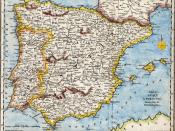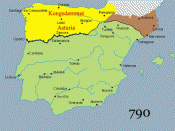The Iberian Peninsula had slowly slipped from Christendom control due to numerous invasions by the Moslems, and by the eighth century, an Islamic state existed well inland, with its main city of Cordoba becoming the largest western European city by the tenth century. As the Frankish empire began to lose its power and influence in the middle ninth century, the 'flood-gates' to the Spanish west were opened for Moorish attacks, and following the sack of Barcelona in 852, the Spanish March fractured into numerous counties. This downward spiral caused an already shortage of military manpower and resources to such a minimal level that the Islamic lords of southern Iberia could not resist the temptation of further assaults--finally establishing the Umayyad caliphate and ending Christendom expansion westward. This Moslem stranglehold existed until 1031, when the collapse of the Umayyad caliphate splintered the Islamic kingdom into twenty-three separate kingdoms--allowing the Christendom kingdoms of the North a great opportunity to reestablish and reconquer lost territory.
Now that the grounds for the see-saw skirmishes had been established, the path for the Christian Reconquista had been paved, but the peculiar background of the former Frankish March, and the emergence of a new 'feudal' system had a dramatic impact on the Christian military capabilities. First, the term feudal, as applied to the situation on the Iberian Peninsula, must be used sparingly, for although there was an institutionalized required call-to-arms, it was far from the strict Frankish feudal system. In the words of Lourie, the Spanish frontier was "a society organized for war," and this was evident with the castles and fortifications that dotted the territories in contact with the Moslems, and the make-up of the armies of the Spanish kingdoms.
In short, it was the king's right to summon the army in times of...



I like this essay
Yep i do say that i do!
3 out of 3 people found this comment useful.